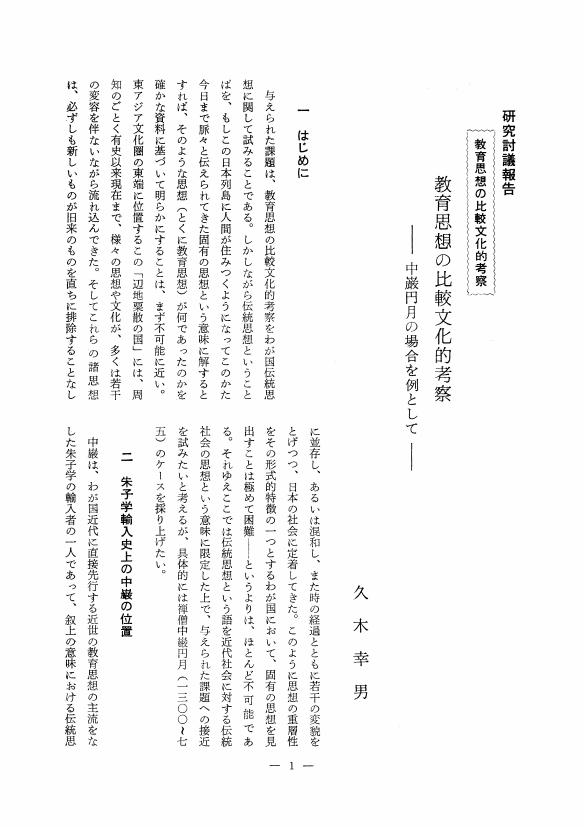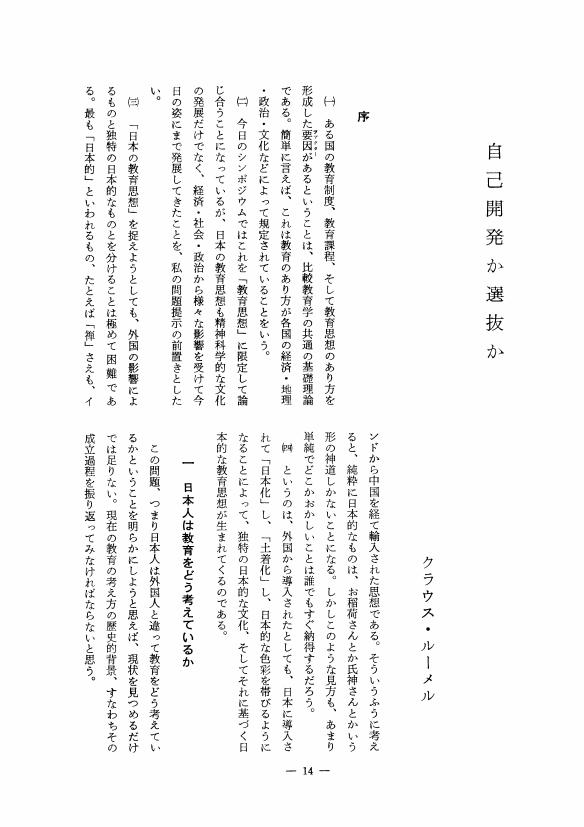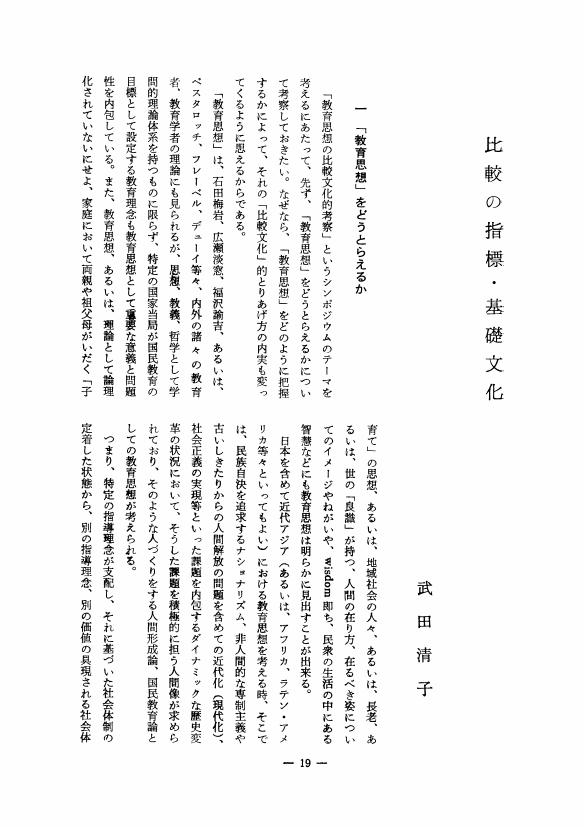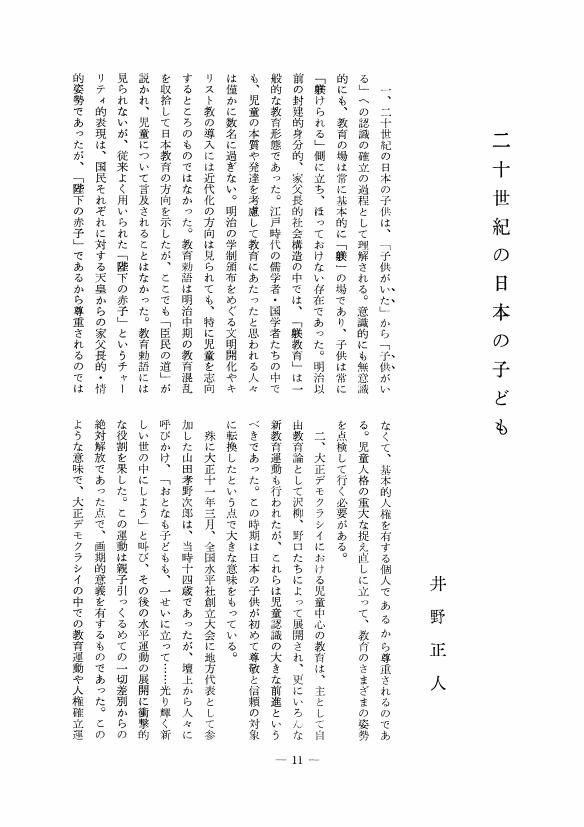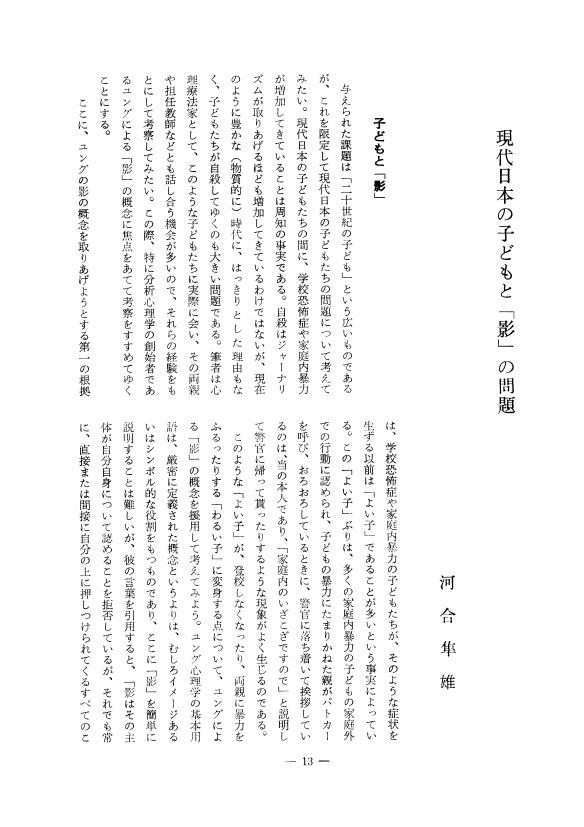1 0 0 0 OA 栗田 修著『デューイ教育学の起源』
- 著者
- 讃岐 和家
- 出版者
- 教育哲学会
- 雑誌
- 教育哲学研究 (ISSN:03873153)
- 巻号頁・発行日
- vol.1980, no.42, pp.100-104, 1980-11-25 (Released:2009-09-04)
本書の著者は、二十余年にわたるデューイ研究の成果に基づく業績を京都大学教育学部に提出して、昭和四七年五月に教育学博士の学位を受けた。本書はその学位請求論文に、その後得られた新しい資料をも検討して加筆し、あるいは書き換えを行なって、昨年末に刊行された研究書である。
1 0 0 0 OA 教育思想の比較文化的考察 中巌円月の場合を例として
- 著者
- 久木 幸男
- 出版者
- 教育哲学会
- 雑誌
- 教育哲学研究 (ISSN:03873153)
- 巻号頁・発行日
- vol.1981, no.43, pp.1-7, 1981-05-10 (Released:2010-01-22)
- 参考文献数
- 11
1 0 0 0 OA 日韓教育思想における戦前と戦後
- 著者
- 池 明観
- 出版者
- 教育哲学会
- 雑誌
- 教育哲学研究 (ISSN:03873153)
- 巻号頁・発行日
- vol.1981, no.43, pp.8-13, 1981-05-10 (Released:2009-09-04)
1 0 0 0 OA 自己開発か選抜か
- 著者
- クラウス ルーメル
- 出版者
- 教育哲学会
- 雑誌
- 教育哲学研究 (ISSN:03873153)
- 巻号頁・発行日
- vol.1981, no.43, pp.14-18, 1981-05-10 (Released:2009-09-04)
1 0 0 0 OA 比較の指標・基礎文化
- 著者
- 武田 清子
- 出版者
- 教育哲学会
- 雑誌
- 教育哲学研究 (ISSN:03873153)
- 巻号頁・発行日
- vol.1981, no.43, pp.19-24, 1981-05-10 (Released:2009-09-04)
1 0 0 0 OA よるべなき両親
- 著者
- ランゲフェルト M・J
- 出版者
- 教育哲学会
- 雑誌
- 教育哲学研究 (ISSN:03873153)
- 巻号頁・発行日
- vol.1980, no.41, pp.88-98, 1980-04-25 (Released:2010-05-07)
1 0 0 0 OA ケルン大学教育学ゼミナールにて
- 著者
- 高祖 敏明
- 出版者
- 教育哲学会
- 雑誌
- 教育哲学研究 (ISSN:03873153)
- 巻号頁・発行日
- vol.1980, no.41, pp.99-105, 1980-04-25 (Released:2010-01-22)
- 参考文献数
- 2
1 0 0 0 OA エーリッヒ・フロム「自己実現」論の成立と構成
- 著者
- 田中 毎実
- 出版者
- 教育哲学会
- 雑誌
- 教育哲学研究 (ISSN:03873153)
- 巻号頁・発行日
- vol.1980, no.42, pp.1-19, 1980-11-25 (Released:2009-09-04)
- 参考文献数
- 78
(1) Erich Fromm's theory of “self-realization” has developed through the process of critical examination into S. Freud's biological-deterministic rationale and his own cultural-deterministic one in his early works, and it consequently includes both of these factors as the vital components.(2) In his theory, therefore, a human-being is regarded as an existence who can realize his own primary potentialities to be for himself only through his self-determining, spontaneous-productive activities as the responses or re-actions to his biological/socio-cultural determinants. In this sense, man's self-realization is the very process of such productive re-activities.(3) The essential point of the controversial issues between Fromm and the other members of the “Frankfurt School” -Horkheimer, Adorno, Marcuse-is concerned with the objective possibility of self-realization within the real context of the present society. However, Fromm's rebuttal against their negative arguments concerning his self-deterministic rationale seems to be insufficient so far as I know.(4) In his theory, the possibility of self-realization is based on his “faith” -or “paradoxical hope” -n human nature inherently having potential powers and strivings for self-realization within itself. By this faith, his practical efforts in psychiatry and his own self-realization have been supported and, at the same time, the faith itself has also been verified through these experiences.(5) Thus, we can grasp the innate construction of Fromm's theory of self-realization as follows.a) His theory is based on the self-deterministic rationale on man's personality.b) But the biological/cultural determinisms are still alive, because in his theory man's self-realization is regarded as the process which is constructed only through his productive re-activities to his own biological/socio-cultural determinants.c) His self-deterministic rationale is founded on the above-mentioned “faith”. In other words, the theory of self-realization is the very product of this faith.(6) The essential process of what is called “ self-formation ” (Selbst-bildung) in educational philosophy can be identified with the self-realization through man's spontaneous-productive re-activities.
1 0 0 0 OA フレーベルにおける神の概念 神の在り方と自然
- 著者
- 岸 信行
- 出版者
- 教育哲学会
- 雑誌
- 教育哲学研究 (ISSN:03873153)
- 巻号頁・発行日
- vol.1980, no.42, pp.20-40, 1980-11-25 (Released:2010-05-07)
- 参考文献数
- 59
The purpose of this paper is to examine the concept of God in Friedrich Fröbel's pedagogy and to shed light on his notion of God, and how he saw the relation between God and nature, taking into consideration the influence other philosophers had on him.In Chapter 1, Fröbel's idea of God and Nature has first been examined, and then his notion of the immanence and the transcendence of God.'Life'is looked upon as the manifestation of God in the natural world, and its dialectic development has been examined.In Chapter 2, Frobel's panentheism has been examined under the following headings : I The influence of Krause (1781-1832);II The influence of monotheism in his home and at school;III 'Unity of Life' (Lebenseinigung) as Fröbel's religious belief.In Chapter III an effort has been made to further clarify Fröbel's notion of God : comparative study has been made of his notion of God and that of Plotinos (204/5-269/70 A. D.), a representative philosopher of Neoplatonism.Natural philosophy of his days as the one found in Schelling (1775-1854) and Christian philosophy were fused into one to form Fröbel's own notion of God.In conclusion, Fröbel's notion of God which is at the core of his pedagogy, is said to be formed by the fusion of natural philosophy and Christian philosophy, and his philosophy of education can be said to be characterised by this fusion.
1 0 0 0 OA 相補説の教育哲学的立場の考察 井上 弘の場合
- 著者
- 武藤 文夫
- 出版者
- 教育哲学会
- 雑誌
- 教育哲学研究 (ISSN:03873153)
- 巻号頁・発行日
- vol.1980, no.42, pp.41-55, 1980-11-25 (Released:2010-01-22)
- 参考文献数
- 19
An attempt is here made to examine through his major works Inoue's viewpoint within the frame of philosophy of education. The paper is divided into three parts : (1) the philosophic-educational meaning of the Coplimental Theory (sôho sestu);(2) the philosophic-educational foundation of this Theory;(3) a critical appraisal of the same Theory.The Complimental Theory seems to attach more importance to accurate practicality rather than to logical originality, and emphasizes a teaching process in which, on the basis of 'learning by discovery', drill, problem solving methods and the project method are employed. As the logical basis a typological theory is stressed which may be called 'additive typology'. This appears as the logical development of discontinuity abstracting from the element of continuity. Another outcome is that the evaluation of eclecticism is turned into the viewpoint of 'elasticity.'In Part (3) the philosophial standpoint has been examined which exhibits very much a logical characteristic of producing a discrepancy between desire and the concrete.
1 0 0 0 OA 「平和教育」をめぐる一つの根本的問題
- 著者
- 村井 実
- 出版者
- 教育哲学会
- 雑誌
- 教育哲学研究 (ISSN:03873153)
- 巻号頁・発行日
- vol.1980, no.42, pp.56-66, 1980-11-25 (Released:2009-09-04)
私は、それがどういう形態をとるにせよ、平和教育と呼ばれるものにかねてから積極的な関心を抱いてきた。それは、単に平和ということが、現代の世界状勢上、子どもたちの教育において当然に強調されなければならないという理由からだけではなくて、さらに、いずれ分っていただけるように、すべての教育活動の目的は結局は人間の間での平和な生活の恒久化に帰着すると見なしうるという、いわば純粋に理論的な理由からでもある。今回のこの小論は、この後者の観点からの教育の現状への批判であり、問題提起の試みである。
1 0 0 0 OA 二十世紀と子どもの教育
- 著者
- 東 日出男
- 出版者
- 教育哲学会
- 雑誌
- 教育哲学研究 (ISSN:03873153)
- 巻号頁・発行日
- vol.1980, no.41, pp.1-5, 1980-04-25 (Released:2009-09-04)
1 0 0 0 OA 二十世紀の子どもと「しつけ」 近代的児童観と教育にみる「助力」と「介入」の思想をふまえて
- 著者
- 市村 尚久
- 出版者
- 教育哲学会
- 雑誌
- 教育哲学研究 (ISSN:03873153)
- 巻号頁・発行日
- vol.1980, no.41, pp.6-10, 1980-04-25 (Released:2009-09-04)
1 0 0 0 OA 二十世紀の日本の子ども
- 著者
- 井野 正人
- 出版者
- 教育哲学会
- 雑誌
- 教育哲学研究 (ISSN:03873153)
- 巻号頁・発行日
- vol.1980, no.41, pp.11-12, 1980-04-25 (Released:2009-09-04)
1 0 0 0 OA 現代日本の子どもと「影」の問題
- 著者
- 河合 隼雄
- 出版者
- 教育哲学会
- 雑誌
- 教育哲学研究 (ISSN:03873153)
- 巻号頁・発行日
- vol.1980, no.41, pp.13-17, 1980-04-25 (Released:2009-09-04)
1 0 0 0 OA 研究討議に関する総括的報告
- 著者
- 森田 孝
- 出版者
- 教育哲学会
- 雑誌
- 教育哲学研究 (ISSN:03873153)
- 巻号頁・発行日
- vol.1980, no.41, pp.18-21, 1980-04-25 (Released:2009-09-04)
1 0 0 0 OA 「対話」と人間形成の課題 「対話への」と「対話による」とのかかわり
- 著者
- 大塚 恵一
- 出版者
- 教育哲学会
- 雑誌
- 教育哲学研究 (ISSN:03873153)
- 巻号頁・発行日
- vol.1980, no.41, pp.22-39, 1980-04-25 (Released:2009-09-04)
- 参考文献数
- 79
In search of the educational means by which the autonomous judgment and the productive activity of the child can be fostered, an attempt was made at the philosophical and anthropological aspect of 'dialogue' based on some particular practice research. Indeed, class teaching which is essentially directed toward an end, aiming at establishing factual relationships, has an aspect which seems to be difficult to be reconciled with a dialogue situation with its open-ended incompleteness and its leisurely character. But is it not possible to combine 'dialogue' in educational and learning activities when one interprets the meaning of 'dialogical' as aiming at an attitude of the thinking subject? In contrast to O. F. Bollnow's theory of 'education toward dialogue' light can be thrown on the problem from the practical and didactic viewpoint of 'through dialogue'.Through an education stressing a 'dialogical' engagement involving the own and the other personality, a social intelligence transcending the individual intelligence may be formed.Furthermore, such an education will be an 'education aiming at speaking'. But here a particular and difficult problem of human formation lies hidden in relation to the peculiarly Japanese and oriental type of taciturnity and silence.
- 著者
- 新井 保幸
- 出版者
- 教育哲学会
- 雑誌
- 教育哲学研究 (ISSN:03873153)
- 巻号頁・発行日
- vol.1980, no.41, pp.40-56, 1980-04-25 (Released:2010-01-22)
- 参考文献数
- 45
E. Krieck was a supporter of a 'pure science of Education' as well as of the ideology of Nazism. In this paper the attempt is made to discuss the connection between these two aspects.Krieck was aligned with Nazism before he developed his theory of pure science of education; there was a reason why he supported Nazism. The reason is that this was the ideology of the petit bourgeois class.The 'pure science of education' is based on two principles. The first is the principle of the superiority of 'the whole' over the 'particular', the second is the principle of discussing being (facts) while not discussing oughtness. The 'whole' in the first principle signifies concretely speaking the national community. Furthermore, the ontological proposition ('the whole anteceds the particular'.), includes the ethical conclusion ('the particular must follow the whole'). Hence the first principle postulates the integration into the national community, i.e. the pre-existing order of rank. This is so because the national community is the only group within which the petit bourgeois exposed to oppression from above and to threat from below, can identify himself. As to the second principle, this is from the beginning destined to destroy itself because it contradicts the first principle which is an expression of faith. But the hypocritical conscience of following the second principle makes its advocate fall a prey to the illusion as if he were not speaking of a subjective faith but of objective facts. Nazism and 'pure science of education' are thus combined in Krieck's thought.
1 0 0 0 OA 「源氏物語」の教育学的考察
- 著者
- 尾田 綾子
- 出版者
- 教育哲学会
- 雑誌
- 教育哲学研究 (ISSN:03873153)
- 巻号頁・発行日
- vol.1980, no.41, pp.57-70, 1980-04-25 (Released:2009-09-04)
Since the time of Norinaga Motoori, the most noted critic of the Tale of Genji in the Edo Period, who said about the book that he could not imagine what purpose it was written for, no one has dared to answer the question, “What had induced the author, Lady Murasaki, to write it?” If it is assumed, however, that Lady Murasaki wrote it as a textbook to be used in educating Chugu Shoshi, daughter of Michinaga Fujiwara and, later, one of the wives of Emperor Ichijo, to be a refined lady, the structure and the implication of the whole book would be cleared up.The aim of Lady Murasaki was to make it possible for young Chugu Shoshi, who was to be the mother of an emperor in future, to see the inner life of the people and to realize the ideal types of love and motherhood through this book, in which the author presented various psychological aspects of human life.
1 0 0 0 OA 現代学校への原理的提議 旧時代日本学校教育態様の講究を通して
- 著者
- 松野 憲二
- 出版者
- 教育哲学会
- 雑誌
- 教育哲学研究 (ISSN:03873153)
- 巻号頁・発行日
- vol.1980, no.41, pp.71-84, 1980-04-25 (Released:2010-01-22)
- 参考文献数
- 14
It is a well known fact that contemporary schools are facing a number of problems. Various solutions are presented and attempts at reform are made. Nevertheless the situation which is supposed to be remedied turns out more and more serious. One of the reasons for that is that the present situation is emptied to such a degree that its emptiness being formally established, is looked upon as an ordinary state of matters; another reason lies in the convictions about education which make it impossible to realise that actually schools are facing a crisis ; hence means and ways for a reform were sought in the mode of the schools of old Japan, and by matching their reality with the modern school, a principle for the regeneration of the school was sought. Thus schools can function properly standing firmly on a modern point of view.The principle here discovered leads to a theory alien to a formalistic consideration of age differences, alien to a fixed view of treating patterns and curricular theories, it is a theory of the meaning of the learning motivation, it is a theory of the relation between politics and education, in a sense an all-too obvious theory. The formation of a consciousness for which this principle is deemed absolutely necessary, was discussed with the end in view that this formation will eventually result from it.
